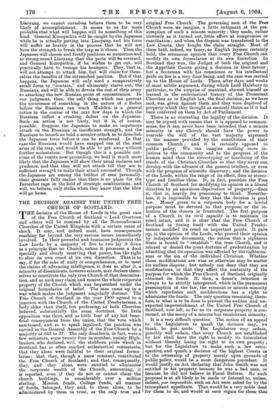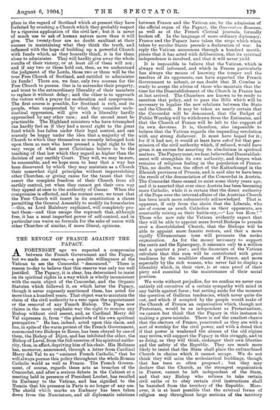THE DECISION AGAINST THE UNITED FREE CHURCH OF SCOTLAND. T HE
decision of the House of Lords in the great case of the Free Church of Scotland v. Lord Overtoun and others will be received by all the Nonconformist Churches of the United Kingdom with a certain sense of shock. It may, and indeed must, have consequences reaching far beyond the very serious issues immediately involved. In their powerful and luminous judgments the Law Lords by a majority of five to two lay it down as a principle that no Church, unless it possesses a deed specially and clearly reserving that power, has the right to alter its own creed at its own discretion. That is to say, if for the sake of unity or comprehension, or to meet the claims of advancing intelligence, it does so alter it, a minority of dissentients, however minute, may declare them- selves to constitute the only true Church of that denomina- tion, and as such may claim and receive the whole corporate property of the Church which was bequeathed under the original formularies of belief. The case came up in a way which makes the judgment singularly distinct. The Free Church of Scotland in the year 1900 agreed to a junction with the Church of the United Presbyterians, a body older than itself, but professing, as both Churches believed, substantially the same doctrines. So little opposition was there, and so little fear of any but bene- ficial consequences from the union, that the vote which sanctioned, and so to speak legalised, the junction was carried in the General Assembly of the Free Church by a majority of 643 to 27. The only dissidents, in fact, were a few ministers, some twenty-four in number, mainly High- landers, who declared, with the stubborn pride which in Scotland has so often marked ecclesiastical contestants, that they alone were faithful to their original formu- laries ; that they, though a mere remnant, constituted the Free Church of Scotland ; and that, consequently, they, and they alone, were entitled to administer the corporate wealth of the Church, amounting, it is reported, even if they do not or cannot claim the church buildings, to considerably over a million sterling. Mission funds, College funds, all manner of funds, belonged, they said, to them alone, to be administered by them in trust, as the only true and original Free Church. The governing men of the. Free Church were, we imagine, a little indignant at the pre- sumption of such a minute minority ; they made, rather unwisely as it turned out, little effort at compromise or conciliation ; and when the dispute was transferred to the Law Courts, they fought the claim straight. Most of them held, indeed, we fancy, as English laymen certainly hold, the erroneous opinion that every Free Church can modify its own formularies at its own discretion. In Scotland they won, the Judges of both the original and the Appellate Courts giving a decision in their favour ; but a Scotsman with his conscience or his intellectual pride on fire is a very dour being, and the case was carried up to the House of Lords. There, after days and weeks of most subtle argument, during which Lord Halsbury in particular, to the surprise of mankind, showed himself as learned in the ecclesiastical history of the Protestant Churches as in English law, the final decision, as we have said, was given against them, and they were deprived of property which they thought as securely theirs as if it had been conferred on them by Act of Parliament.
There is no contesting the legality of the decision. It may be argued with reason that it is opposed to common- sense, for it can never have been intended that a minute minority in any Church should have the power to override the will of the vast majority expressed in the manner provided by the constitution of their common Church • and it is certainly opposed to public policy. We can imagine nothing more in- jurious to the community and to the progress of the human mind than the stereotyping or fossilising of the creeds of the Christian Churches so that they never can develop with the advance of the general intellect, or even with the progress of scientific discovery ; and the decision of the Lords, within the range of its effect, does so stereo- type and fossilise them. It, in fact, punishes the Free Church of Scotland for modifying its opinion in a liberal direction by an enormous deprivation of property,—fines it, that is, heavily for presuming to think. Neverthe- less, it is impossible to deny that the decision is good law. Money given to a corporate body for a lawful purpose must be devoted to that purpose, or the in- tention of the donors is frustrated. The first purpose of a Church in its civil capacity is to maintain its creed intact, and it is clear that the Free Church of Scotland in fusing itself with the United Presby- terians modified its creed on important points. It gave up, in the opinion of the Lords, who proved their opinion by indisputable documents, the notion that a righteous State is bound to " establish " the true Church, and it relaxed or denied the great doctrine of predestination by admitting that its operation was affected by the righteous- ness or the sin of the individual Christian. Whether those 'modifications are wise or otherwise may be matter for endless dispute ; but nobody can deny that they are modifications, or that they affect the continuity of the purpose for which the Free Church of Scotland originally obtained its funds. If, then, a donor's intention is always to be strictly interpreted, which is the permanent presumption of the law, the remnant or minute minority which repudiates such modifications has a right to administer the funds. The only question remaining, there- fore, is what is to be done to prevent the sudden and un- expected impoverishment of the United Free Church of Scotland, now left, as far as its corporate property is con- cerned, at the mercy of a minute but recalcitrant minority.
It is a very difficult question. The notion of an appeal to the Legislature to quash the decision may, we think, be put aside. The Legislature may ordain, possibly will ordain, that every Church not established by law shall have the right to modify its formularies without thereby, losing its right to its own property ; but for the Legislature to make such a law retro- spective, and quash a decision of the highest Courts as to the ownership of property merely upon grounds of public policy, would be a most dangerous precedent. It would justify an Act declaring that John Smith was not entitled to his property because he was a bad man, or because he did not believe in Fiscal Reform. No such proposal is at all likely to be made or listened to, unless, indeed, par impossibile, such an Act were asked for by the triumphant appellants. That would be a very noble deed for them to do, and would at once regain for them that place in the regard of Scotland which at present they have forfeited by crushing a Church which they probably respect by a rigorous application of the civil law ; but it is never of much use to ask of human nature more than it will give. The twenty-four are no doubt exultant at their success in maintaining what they think the truth, and inflamed with the hope of building up a powerful Church with funds which, as they honestly think, it is for them alone to administer. They will hardly give away the whole results of their victory, or at least all of them will not ; and if any two or three hold out, then, as we understand the judgment of the Lords, those two or three will be the true Free Church of Scotland, and entitled to administer its funds ! There are, we fear, only two courses for the Free Church to pursue. One is to surrender their property, and trust to the extraordinary liberality of their members to replace it without delay ; and the other is to approach the victors with a prayer for moderation and compromise. The first course is possible, for Scotland is rich, and its people, when exasperated by what they consider eccle- siastical oppression, will give with a liberality hardly approached by any other race ; and the second must be practicable. The Highland ministers who have triumphed can hardly feel as if they had a moral right to the great fund which has fallen under their legal control, and can scarcely be happy under the idea that a majority of the Church to which they themselves so recently belonged look upon them as men who have pressed a legal right to the very verge of what most Christians believe to be the teaching of that law which they regard as higher than the decision of any earthly Court. They will, we may be sure, be reasonable, and we hope soon to hear that a way has been discovered by which they may maintain as a Church their somewhat rigid principles without impoverishing other Churches, or giving cause for the taunt that they assert the complete freedom of their Church from all earthly control, yet when they cannot get their own way they appeal at once to the authority of Caesar. When the compromise is effected, and the contest over, we trust that the Free Church will insert in its constitution a clause permitting the General Assembly to modify its formularies —this, as Lord Halsbury explained, will completely pro- tect them—and thus escape the reproach that, although free, it has a most imperfect power of self-control, and in particular can waive no formula for the sake of union with other Churches of similar, if more liberal, opinions.







































 Previous page
Previous page